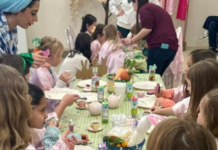 I sat on an old black leather couch in our son’s new psychologist’s office, wondering what the future held. The psychologist explained she would write up the two days’ worth of testing results, and we would meet again to review. I noticed my fingernails digging into the worn leather as I asked if she knew what was going on with my son. She responded, “Oh yes, he has autism.” Tears streamed down my face as I saw our son playing on the floor. He has autism. I reminded myself that he was still the same sweet, funny, passionate little boy that walked into the doctor’s office that day, but now we knew.
I sat on an old black leather couch in our son’s new psychologist’s office, wondering what the future held. The psychologist explained she would write up the two days’ worth of testing results, and we would meet again to review. I noticed my fingernails digging into the worn leather as I asked if she knew what was going on with my son. She responded, “Oh yes, he has autism.” Tears streamed down my face as I saw our son playing on the floor. He has autism. I reminded myself that he was still the same sweet, funny, passionate little boy that walked into the doctor’s office that day, but now we knew.
Fast forward six years, I found myself on a couch talking about my son’s autism, but this time it was to him. For years we talked about what we would say if he asked. We wondered if we were ready. But he never asked.
After much discussion, we decided it was time.It was important for him to know and understand. So, the research began: how to tell, when to tell, what to say. I was surprised by how little was out there; enough information to get us started, but not the wealth of guidance from families who’d been there before—who’d lived through what we were struggling with.
We wrote a script and rewrote it, and rewrote it again. The words were important, the tone was important, and the message was important. When we found out about his diagnosis, we were overwhelmed – autism was not what we wanted for our son. What did it mean? What would his future be? How could we begin to help him?
By telling my son, we had the opportunity to frame his diagnosis positively, so he understood autism is a part of what makes him unique. We know everyone has strengths and challenges, so it’s great that we understand his so we can help him be the best he can be.
By nature, I am a planner and an over preparer; nailing the script was critical to me, and I spent a lot of time working on it. I had my outline and knew the points I wanted to make, but I struggled with how to open the conversation. When it finally came to me, I knew it was right, a question but more of a statement and something he was both intensely proud of and knew to be true. Have you ever thought about why you are such a great Historian or a Lego Master at such a young age?
Once I had the script, the next hurdle was finding the right moment—not too forced, and definitely not a big, awkward “after school special” sit-down. We wanted the conversation to happen before the end of the school year, so he could talk to his school team and feel supported if he chose. That moment came to us when my son had been home sick for a few days, which provided a window of opportunity when his sister was in school, and he’d have time to process the situation on his own. We had reviewed and practiced the script. We were ready—but I was so nervous.
We sat on the couch and started with the opening about his strengths. I could tell that he was curious about where this was going. Deep breath. Some of your strengths come from having autism. That means that your brain works a little differently than other kids’ brains.
My son was quiet and a little uncomfortable. Next, we talked about challenges associated with autism and the team that surrounds him. Then all the famous people with autism and like them, he can and will achieve great things. My son responded defiantly, and in a familiar fashion, I know about Elon Musk; I watch documentaries!
We finished our prepared script: Everyone has challenges and needs help; what’s most important is understanding our strengths and challenges to be the best we can be. My son was now determinedly not looking at us. And mommy and daddy are always here if you have any questions. Breathe.
The only question he asked was if we were done talking.
I went upstairs and cried. I didn’t know what I was feeling. Empty. Confused. Alone. Sad. A few hours later, my son and I were in the car, and I reminded him we were here if he had any questions. “Uh-huh,” I asked if he had ever thought about it before. “No.” And my heart broke a little more.
In all our preparation, research, and discussions, there was one thing I hadn’t thought of – from this day forward, my son would always know he had autism. His life would be different because his perspective would be different. Not better or worse but altered. In my heart, I knew it was better for him to know but also harder. And for that, I was immensely sorry.
The first question came a few weeks later while my husband was driving, “Dad, what’s that thing I have that makes me smart? Au-something? I want to tell my sister about it.”
Over the next few months, my son began asking more questions about his “amnesia,” trying not to laugh, we would explain it was autism, not amnesia, and then answer his question. But it was clear he had heard the words we used during our discussion, and to him, autism was not a negative word.
A few weeks later, he told someone for the first time that he had autism. He was at a fishing camp and by lucky coincidence one of his instructors was a family friend. We mentioned to the instructor that we had just told him about his diagnosis and that he might say something. The instructor responded, “Oh yeah, he did yesterday. I noticed he was quiet, so I asked if he was okay. He responded, ‘Yes, I’m just reading. I have autism.” The instructor told my son that was great because autism makes him unique! We were incredibly grateful that he had such a positive response as he shared his autism for the first time.
Understanding where autism begins and ends is challenging for an adult and even more so for a child. My son works to understand the nuances of autism versus his personality. The two are separate but often seem the same.
He told me that autism made him extra sensitive because sometimes I make him feel bad when he gets in trouble. I tried to explain that not everything about him is autism and that his sensitivity is part of his personality and that I would try not to hurt his feelings when I ask him to pick up his Legos.
Another day, his sister was giving him a hard time, and he came to me, “Mom, you know how autism makes some things difficult for me? Having a loud younger sister is difficult for me!” I explained that was part of the joy of being an older brother, not autism.
Like many children with autism, my son likes facts. He collects and stores them in his brain, much like he collects baseball cards and coins. He began on his journey to understand the facts about autism. What percentage of the population has autism? 2% (which seems so small when the stat you usually hear is 1 in 44 children). Am I the first person in our family to have autism? As far as we know, he is the first. He thought that was pretty cool and suggested we do ancenstry.com to confirm. A typical brain can remember seven things at one time; is that the same or bigger for people with autism? We talked about how autism is different for everyone. Some autistic people can remember more and some less.
As my son began fifth grade, each morning was a struggle, but he would come home happy. One night he asked if next year he could go to a school just for kids with autism, so there would be more people like him there. I asked if he was happy at his school, he said yes but only a few people “got him” and he wanted to be in a school with more kids like him.
My son was now seeing his differences from other kids – did I cause that? Or is it that his differences were now making sense in a way they didn’t before?
Hearing him say that he didn’t relate to many kids broke my heart because no matter what I did, I couldn’t protect him from that feeling. The desperation I felt to protect him was deep, instinctual, and hurt me more than him. We want him to feel connected and make more friends, but we also want him to be challenged and exposed to all sorts of people because that is what the world is filled with and what he will have to tackle when he gets older.
In a few months, my son will graduate from elementary school. He hasn’t asked about going to a special school again, in fact he’s expressed that he’s excited to go to Middle School and find out if they have a history club – a great sign that he’s looking for people like him. We know he has told some of his classmates about his autism. We’re not sure what fifth graders know or understand about autism, but we hope they were kind.
My son understands it’s up to him if he chooses to share his autism with someone and he will now be prepared if someone brings it up to him.
The past seven years have been a journey and my husband and I have sat on many more therapists’ couches to learn more about our son and autism. There is so much to unpack, and despite our dedication to it we still don’t totally understand it. We have learned that’s okay.
Our goal is to help our son understand his autism, but also understand it doesn’t define or limit him in any way. His journey with autism started when we told him about his diagnosis, and now he gets to define what having autism means to him.
 Maureen lives in Fairfield with her husband and son (2010) and daughter (2013). She grew up in Villanova, PA and went to Fairfield University. Little did she know that she would marry a “townie” years after college. She lived in the city for 20 years and moved back to Fairfield right before her daughter was born in 2013. Most of her career has been in advertising sales at venerable magazines like Better Homes & Gardens and O, The Oprah Magazine. She is currently VP, Connections at iHeartMedia. The last two years have given her the opportunity to spend less time on MetroNorth and more time sharing meals with her family, going on long walks, volunteering at her kids’ school, coaching softball, and consistently getting to Bar Method.
Maureen lives in Fairfield with her husband and son (2010) and daughter (2013). She grew up in Villanova, PA and went to Fairfield University. Little did she know that she would marry a “townie” years after college. She lived in the city for 20 years and moved back to Fairfield right before her daughter was born in 2013. Most of her career has been in advertising sales at venerable magazines like Better Homes & Gardens and O, The Oprah Magazine. She is currently VP, Connections at iHeartMedia. The last two years have given her the opportunity to spend less time on MetroNorth and more time sharing meals with her family, going on long walks, volunteering at her kids’ school, coaching softball, and consistently getting to Bar Method.
























